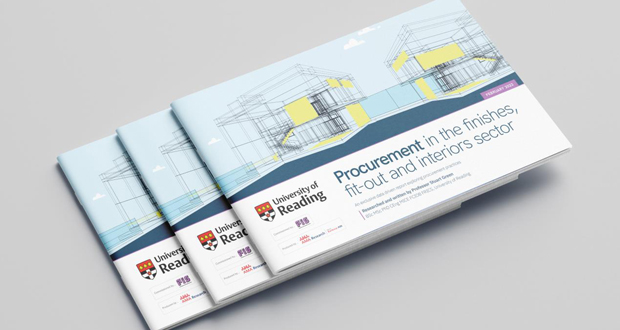A new report Procurement in the Finishes, Fit-Out and Interiors Sector, which has been launched by University of Reading, Finishes and Interiors Sector (FIS) and AMA Research (part of Barbour ABI) aims to better understand how procurement practices are affecting the £10 billion fit-out industry and most importantly, how they can be improved.
FIS last year raised concerns that the push for modern methods of construction was being undermined by lack of focus on modern methods of procurement. To better understand the evolution of procurement practices, the organisation commissioned Professor Stuart Green of the University of Reading to explore procurement practices in the UK fit-out sector. FIS has a close working relationship with AMA Research, who were also keen to explore this topic and support this work and were able to offer assistance in developing the survey and extending the reach for participation.
This has resulted is a new report that benchmarks current practices from those contractors directly involved and explores how procurement impacts effective delivery. Through better understanding of the challenges facing the industry, the sector can deliver better value and improve supply chain relationships.
The nature of the procurement process is often identified as a barrier to change. Dame Judith Hackitt’s statement from the 2018 ‘Building a Safer Future’ Report, confirmed that “Improving the procurement process will play a large part in setting the tone for any construction project. This is where the drive for quality and good outcomes, rather than lowest costs must start”.
FIS Chief Executive Iain Mcllwee stated: “The key to unlocking the potential of construction and unleashing the culture change that we need in the finishes and interiors sector sits squarely in procurement. That isn’t a revelation. Virtually every report written about the construction process has raised concerns about procurement practices that facilitate a race to the bottom and create adversarial relationships and it crops up in almost every conversation I have about improving the sector. This is felt most acutely in our sector which absolutely sits at the whip end of construction when programmes and budgets are stretched or there is huge pressure to get the work done to leverage the value of a building.”
This new report furnishes the ongoing debate with concrete data and provides a voice to those who work in the fit-out sector. It is based on both a questionnaire conducted online during July and August 2022 that returned 269 responses with 100 per cent quality rating on results and then supplemented with 20 in-depth interviews with selected practitioners representing contractors operating at all tiers of the supply chain. The research raised serious questions about time allocation in procurement and tendering processes, and worryingly how risks are routinely pushed down the supply chain.
Professor Stuart Green, School of Construction Management and Engineering at the University of Reading said: “I have been hugely impressed with the leading-edge firms in the fit-out and interiors sector. They are crucially focused on delivering high-quality work to demanding deadlines. Such firms act as exemplars for collaborative working at its very best.
“But many firms within the sector don’t get the chance to work collaboratively. This is especially true of the smaller firms who act as subcontractors. Procurement practices are too often focused on low-cost tendering with little consideration of other factors. Subcontractors are further obliged to accept highly onerous conditions of contract which undermine trust from the outset. The smaller firms are frequently pressurised to reduce their tender price retrospectively and to offer discounts in return for prompt payment. It seems that old-fashioned subbie bashing is alive and well in the fit-out sector. This cannot be the basis upon which to sustain a modern industry.”
Mcllwee concluded: “The regulatory, environmental, commercial and moral drivers for change have never been stronger and this research-based report has given a voice to all in the supply chain and is the start of a practical call to action for positive change.”
FMJ in conjunction with Grundon Waste Management is pleased to launch the 2023 waste management and recycling survey which examines the ways in which FMs approach their waste management responsibilities.
In this, the sixth year for the annual appraisal, we know there is a greater opportunity than ever for FMs to reappraise their waste and recycling operations and help their organisations meet the growing pressure to achieve ESG goals.
We want to learn how FMs have adapted to the legislative, economic and societal changes of the past year and how they plan to meet the latest waste and recycling targets.
In this survey we’ve posed a series of questions which include insights into FMs’ waste management strategy and targets, how they’re moving towards zero waste targets, and the importance of not just meeting compliance targets but also ESG goals.
The results of the 2023 survey will be published in FMJ magazine and form the basis of a white paper co-written by FMJ and the experts at Grundon on how to approach waste and recycling strategies.
To take part click here.





